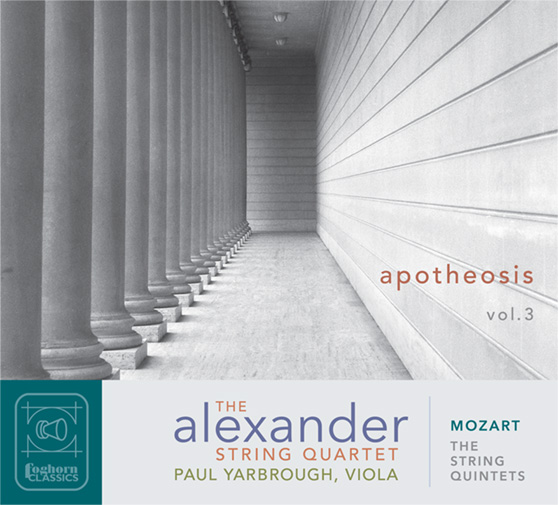apotheosis
(vol.3) mozart string quintets
ALEXANDER STRING QUARTET
PAUL YARBROUGH, VIOLA
FCL 2024
Excerpt from the liner notes by Eric Bromberger:
We think of Mozart as a pianist, but he was also a violinist, and a very good one. After playing a series of concerts in 1777, the 21-year-old exulted: “I played as though I were the greatest fiddler in all of Europe.” Yet the role of violinist appears to have had limited appeal for Mozart, and when he played chamber music, he invariably chose to play the viola. There are many accounts, especially during his years in Vienna, of Mozart’s playing the viola in chamber performances. These range from the famous “quartet evening” in 1784 (when Dittersdorf and Haydn were the violinists and Vanhal the cellist) to the premiere of his Clarinet Quintet in December 1789. Why was Mozart drawn to the mid-range role of the viola rather than the more extroverted role of violinist? Perhaps he liked being in the “middle” of the music, where harmonies shift and unexpected rhythms underpin the more exposed melodic lines. Perhaps he simply liked the husky sound of the viola. Whatever the reason, Mozart felt a particular fondness for the viola, a fondness that showed up in some very particular ways in his chamber music.
Like almost every other composer, Mozart found the string quartet a supremely challenging form. He was usually a fast worker, but it took him several years to compose the six quartets he dedicated to Haydn in 1785, and he readily admitted that those quartets had been “the fruit of long and laborious study.” Yet the addition to the string quartet of one more instrument — the viola — appears to have freed Mozart in unexpected ways, and his six string quintets offer a different kind of music from his quartets, magnificent as those are. In his quintets, Mozart did not set out to make the viola the star, but the addition of the extra viola offered him a broader canvas and unlocked new possibilities. His quintets generate a richer, fuller sound — one that can at times emphasize the sound of the viola — and they offer increased opportunities to contrast different groupings of instruments and sonorities. They also provided Mozart with grander vistas: his quintets are in general longer than his quartets (two of these quintets are among his longest chamber works, longer in fact than any of his symphonies). One senses, in ways hard to define, that Mozart was more comfortable writing string quintets than he was writing string quartets.
Mozart composed his first string quintet at age 17 and his last in the year of his death, so it might seem that he wrote string quintets across the span of his career, but that is not the case. His first quintet was a foray into new territory for the young composer, and then Mozart set the form aside for fourteen years — his final five quintets were all created in the last four years of his life. As such, they represent some of his most sophisticated musical thinking. They offer wonderful music, exhilarating to hear (and to play!), sometimes very moving, and always very beautiful.
(Each quintet is discussed in-depth in Eric Bromberger's liner notes)
More Mozart:
Brahms & Mozart — Clarinet Quintets
Mozart Final Quartets (Apotheosis vol. 1)
Mozart Piano Quartets (Apotheosis vol. 2)
Homage (”Haydn Quartets”)
Order Now
ORDER NOW
• • •
TWO-CD SET INCLUDES:
DISC 1
String Quintet in B-flat Major, K. 174
String Quintet in C Major, K. 515
DISC 2
String Quintet in G Minor, K. 516
String Quintet in C Minor, K. 406 (K. 516b)
DISC 3
String Quintet in D Major, K. 593
String Quintet in E-flat Major, K. 614
